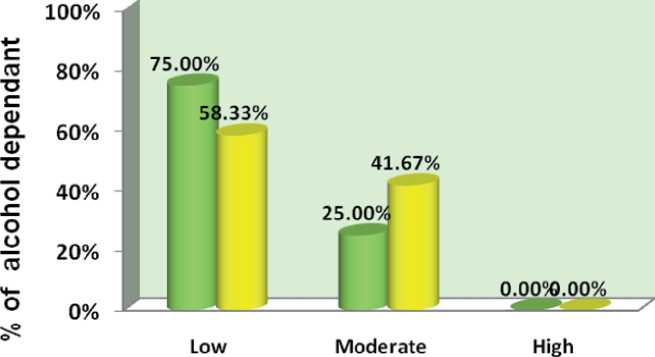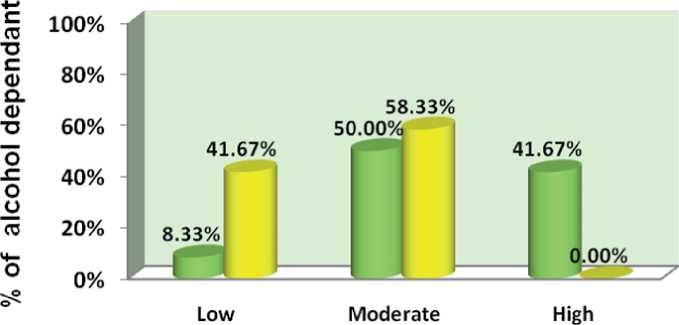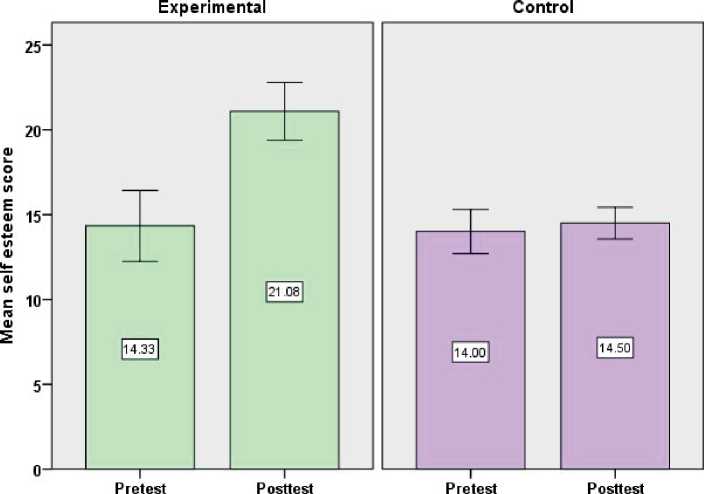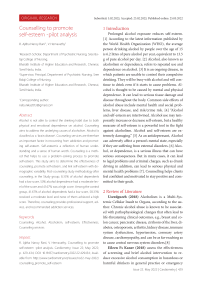Counselling to promote self-esteem -pilot analysis
Автор: Rani R.A.N., Hemavathy V.
Журнал: Cardiometry @cardiometry
Рубрика: Original research
Статья в выпуске: 22, 2022 года.
Бесплатный доступ
Alcohol is not able to control the drinking habit due to both physical and emotional dependence on alcohol. Counseling aims to address the underlying causes of alcoholism. Alcohol is classified as a ‘brain disease’. Counseling services are therefore an important factor in recovering from addiction and promoting self-esteem. Self-esteemis a reflection of human understanding and a sense of human worth. Counseling is a method that helps to use a problem-solving process to promote self-esteem. This study aims to determine the effectiveness of counseling, promote self-esteem, and link self-esteem with demographic variability. Post-counseling study methodology after counseling, in the Study group, 8.33% of alcohol dependents had a low score, 50% alcohol dependence had a moderate level of the score and 41.67% was a high score. Among the control group, 41.67% of alcohol dependents had a low score, 58.33% received a moderate level and none of them achieved a high score. Therefore, counseling provides professional support, advice, and recommended addiction services.
Counseling, alcohol, alcoholism, self-esteem, effectiveness, counseling services
Короткий адрес: https://sciup.org/148324625
IDR: 148324625 | DOI: 10.18137/cardiometry.2022.22.429434
Текст научной статьи Counselling to promote self-esteem -pilot analysis
R. Ajitha Nancy Rani, V. Hemavathy. Counselling to promote self-esteem -pilot analysis. Cardiometry; Issue 22; May 2022; p. 429-434; DOI: 10.18137/cardiometry.2022.22.429434; Available from: counselling_promote_self-esteem
Prolonged alcohol exposure reduces self-esteem. [1] According to the latest information published by the World Health Organization (WHO), the average person drinking alcohol by people over the age of 15 is 6.2 litres of pure alcohol per year, equivalent to 13.5 g of pure alcohol per day. [2] Alcohol, also known as alcoholism or dependence, refers to repeated use and dependence on alcohol. [3] It is an ongoing disease, in which patients are unable to control their compulsive drinking. They will be busy with alcohol and will continue to drink even if it starts to cause problems. Alcohol is thought to be caused by mental and physical dependence. It can lead to serious tissue damage and disease throughout the body. Common side effects of alcohol abuse include mental health and social problems, liver disease, and risk/crime risk. [4] “Alcohol and self-esteem are intertwined. Alcohol use may temporarily increase or decrease self-esteem, but a healthy measure of self-esteem is a powerful tool in the fight against alcoholism. Alcohol and self-esteem are extremely damaging.” [5] As an antidepressant, Alcohol can adversely affect a person’s mental state, especially if they are suffering from external disorders. [6] Alcohol, or dependence, is a serious illness that can have serious consequences. But in many cases, it can lead to legal problems and criminal charges, such as drunk driving in addition, can lead to serious physical and mental health problems [7]. Counselling helps clients feel confident and motivated to stay positive and committed to their goals.
2 Review of Literature
Uceedguzeh (2018) Alcoholism is a Multi-Systemic Cellular Insult to Organs, according to the author. Chronic alcohol abuse is known to be associated with pathophysiological changes that often lead to life-threatening clinical outcomes, e.g., breast and colon cancer, pancreatic disease, cirrhosis of the liver, diabetes, osteoporosis, arthritis, kidney disease, immune system dysfunction, hypertension, coronary artery disease, cardiomyopathy, and can be as far-reaching as to cause central nervous system disorders.[8]
Eileen Fs Kaner (2018) assess the effectiveness of screening and brief alcohol intervention to reduce excessive alcohol consumption in hazardous or harmful drinkers in general practice or emergency care settings. It included randomized controlled trials (RCTs) of brief interventions to reduce hazardous or harmful alcohol consumption and found moderate‐quality evidence that brief alcohol interventions have little impact on the frequency of binges per week (MD ‐0.08, 95% CI ‐0.14 to ‐0.02; 15 studies, 6946 participants [9]
Abhijit Nadkarni (2019) conducted a study on alcohol use and alcohol-use disorders among older adults in India and concluded Alcohol use and misuse are a problem among Indian older adults. Socio-demographic changes will further increase longevity [10].
Suvitha(2017) assessed the level of self-esteem and alcohol consumption among male adolescents. A descriptive design with a quantitative method was adopted. The study was restricted to the sample size of about 60 male adolescents aged between 18-20 years through the purposive sampling technique [11]. The investigator used a standardized tool of AUDIT-Al-cohol use disorder identification test and Rosenberg self-esteem scale. Data analysis was done using SPSS v 16.0 software. Results revealed that the majority of the adolescents had positive self-esteem (80 %) and only (20%) presented low self-esteem. With AUDIT score, 75 % did not consume alcohol hazardously and no samples were fall under the category of high-risk level and alcohol dependence. [12]
3 Materials and Methods
A quantitative evaluative research approach was adopted to analyze the effectiveness of counseling regarding Coping strategies to promote self-esteem among alcohol-dependent [13]. An experimental research design was used for the study [14]. The sample was alcohol dependence of 18 to above 60 years who fulfill inclusion criteria. Probability simple random sampling technique was applied with the tool of 3 parts, demographic variables, Rosenberg self-esteem scale, and counseling interventions [15].
4 Results and Discussion
Table 1 shows the Data compares pre-test level [16] of self-esteem amongTest and control groups of alcohol dependence. Prior to counseling, in the Study group, 75% of alcoholism was low, 25% of alcoholism was moderate and no one received a high score. In the control group, 58.33% of alcoholics had a low score, 41.67% of alcoholism had an average score and 430 | Cardiometry | Issue 22. May 2022
none of them had a high score. The level of self-esteem effect on Test Vs Control group has been correlated using chi-square [16]. Figure 1 shows the Self-Esteem among Test and Control Group of Alcohol Dependence.
Table 2 shows the Data Compare Post-Test [16] Level of Self-Esteem among a Control Group [16] of Alcohol Dependence. After psychological counselling, in the Experiment group, 8.33% of people who drank alcohol had low scores, 50% of them had a moderate level and 41.67% of them had high scores. In the control group, 41.67% of alcohol addicts received low scores, 58.33% of them forced middle scores and none of them registered for high scores. Statistically, there is a difference between the test and the control group. The level of confidence among the test and control groups was assessed by chi-square. Figure 2 represents Self-Esteem within Experiment and Control Group.
Considering the initial test, the Alcohol-Based Examination Test Team scored 14.33 points and in the control group, which scored 14.00 points, hence the difference obtained 0.27, this difference is small and significant statistically. The Table 3 shows the Assessment of Mean [16] Self Esteem Score between Experiment and Control Group.
In terms of post-test testing, the alcohol-based Test team scored 21.08 points and after testing, scored 14.50 points, so the difference is 6.58, which gives statistical importance. The difference between pre-test and post-test is derived using the student’s independent t-test [17]. Figure 3 shows the Assessment of Mean Self-Esteem Score between Experiment and Control Group.
Effectiveness of Counselling and Generalization of Self Esteem
The test group scored 22.50% confidence points while the control group gained only 1.67%. Differences in normal performance on pre-Vs post-test scores were calculated using a difference between 95% CI [18]. Table 4 shows the Effectiveness of Counselling on the Level of Self-Esteem
Table 5 shows the correlation of the post-test level of self-esteem result with demographic variables of alcohol dependence. For 40-60 years, men / other people who depend on alcohol have higher self-esteem than others [19]. Mathematical significance is assessed using the Chi-square/ Yates test to adjust the chi-square [20].
Table 1
Pre-Test [16] Level of Self-Esteem Score
|
Self-esteem level Test Group |
Test Group[16] |
Control Group[16] |
Chi-square test[16] |
||
|
n |
% |
n |
% |
||
|
Low |
9 |
75.00% |
7 |
58.33% |
χ2=0.75P=0.39(NS) |
|
Moderate |
3 |
25.00% |
5 |
41.67% |
|
|
High |
0 |
0.00% |
0 |
0.00% |
|
|
Total |
12 |
100.00% |
12 |
100.00% |
|
PRETEST LEVEL [16] OF SELF ESTEEM

■ Experime ntal
Figure 1. Reflect Pre-Test Level [16] of Self-Esteem among Test and Control Group of Alcohol Dependence
Table 2
Post-Test [16] Level Self-Esteem.
|
Level of self-esteem |
Test Group [16] |
Control Group[16] |
Chi-square[16] test |
||
|
n |
% |
n |
% |
||
|
Low level |
1 |
8.33% |
5 |
41.67% |
χ2=7.74P=0.05*(S) |
|
Moderate level |
6 |
50.00% |
7 |
58.33% |
|
|
High level |
5 |
41.67% |
0 |
0.00% |
|
|
Total |
12 |
100.00% |
12 |
100.00% |
|
POSTTEST LEVEL[16] OF SELF ESTEEM SCORE

Experimen tai
Figure 2. Analyses Post-Test [16] level of Self-Esteem within Experiment and Control Group [16]
Table 3
Assessment of Mean [16] Self Esteem Score Between Experiment and Control Group
|
Group |
N |
Mean [16] |
Mean Gain Score |
Student Independent t-test [16] |
|
|
Pre-Test |
Experiment |
12 |
3.63 |
0.27 |
t=0.27 p=0.78 (NS) |
|
Control |
12 |
2.26 |
|||
|
Post –Test |
Experiment |
12 |
2.94 |
6.58 |
t=6.80 p=0.001*** (S) |
|
Control |
12 |
1.62 |
|||

Error bars: +/- 2 SE
Figure 3. Assessment of Mean Self-Esteem Score between Experiment and Control Group [17]
Table 4
Declares the Effectiveness of Counselling on the Level of Self-Esteem.
|
Group |
Test |
Maximum score |
Mean score |
MeanDifference of self-esteem gain score with 95% Confidence interval[17] |
Percentage Difference of selfesteem gain score with 95% Confidence interval[17] |
|
Experiment group [17] |
Pre-test |
30 |
14.33 |
6.75(3.52 – 9.98) |
22.50% (11.73% –33.27%) |
|
Post-test |
30 |
21.08 |
|||
|
Control group[17] |
Pre-test |
30 |
14.00 |
0.50(-0.08 – 1.08) |
1.67% (-0.27% –3.60%) |
|
Post-test |
30 |
14.50 |
Table 5
Association among Post-Test Level [18] of Self Esteem Score with Demographic Variables (Test Group)
|
Demographic variables [18] |
Post-test level Self-esteem score |
n |
Chi-square test/Yates corrected chi-square test [18] |
||||
|
Low/Moderate[18] |
High |
||||||
|
n |
% |
n |
% |
||||
|
Age in Years |
18 -40 years |
6 |
100.00% |
0 |
16.67% |
6 |
χ2=5.49 p=0.02*(S) |
|
41 -60 years |
1 |
16.66% |
5 |
83.34% |
6 |
||
|
Religion |
Hindu |
4 |
57.14% |
3 |
42.86% |
7 |
χ2=0.01 p=0.92 (NS) |
|
Muslim/Christian |
3 |
60.00% |
2 |
40.00% |
5 |
||
|
Type of Family |
Nuclear family |
6 |
66.67% |
3 |
33.33% |
9 |
χ2=1.03 p=0.31(NS) |
|
Joint family |
1 |
33.33% |
2 |
66.67% |
3 |
||
|
Demographic variables [18] |
Post-test level Self-esteem score |
n |
Chi-square test/Yates corrected chi-square test [18] |
||||
|
Low/Moderate[18] |
High |
||||||
|
n |
% |
n |
% |
||||
|
Marital Status |
Married |
6 |
66.67% |
3 |
33.33% |
9 |
χ2=1.03 p=0.31(NS) |
|
Unmarried |
1 |
33.33% |
2 |
66.67% |
3 |
||
|
Occupation |
Cooley/Driver |
6 |
100.00% |
0 |
16.67% |
6 |
χ2=5.49 p=0.02*(S) |
|
Businessmen/others |
1 |
16.66% |
5 |
83.34% |
6 |
||
|
Monthly Income |
Rs 5000 – 15000 |
3 |
75.00% |
1 |
25.00% |
4 |
χ2=0.68 p=0.41(NS) |
|
Rs 15000 and above |
4 |
50.00% |
4 |
50.00% |
8 |
||
|
Presence Of Family Members with the Habit of Substance Abuse |
Yes |
6 |
66.67% |
3 |
33.33% |
9 |
χ2=1.02 p=0.31(NS) |
|
No |
1 |
33.33% |
2 |
66.67% |
3 |
||
|
Duration of Taking Alcohol |
<4 years |
3 |
75.00% |
1 |
25.00% |
4 |
χ2=0.68 p=0.40(NS) |
|
>4 years |
4 |
50.00% |
4 |
50.00% |
8 |
||
|
Which of the Following is a Precipitating Factor to Consume Alcohol? |
Experimental/peer pressure |
3 |
75.00% |
1 |
25.00% |
4 |
χ2=0.68 p=0.40(NS) |
|
Financial/Family |
4 |
50.00% |
4 |
50.00% |
8 |
||
|
Which of These Periods Did you Attend the Last Counselling Session? |
1 year back |
2 |
40.00% |
3 |
60.00% |
5 |
χ2=1.18 p=0.27(NS) |
|
Never attended before. |
5 |
71.42% |
2 |
28.58% |
7 |
||
5 Conclusion
From current research, Addiction can make it difficult to feel good about themselves and their abilities, especially focusing on past mistakes. Self-confidence with self-esteem can be an important part of the recovery process, so finding ways to build self-confidence and self-esteemcan make it easier to appreciate strengths. Self-help strategies can be a great way to start developing self-confidence. Counselling is required to address the root causes of alcoholism. Counselling supports emotional testing and provides excellent resources for combating alcoholism. Counselling helps in diagnosing the problem and the level of the problem the patient is addicted to, Counselling helps to find a solution, Counselling helps to learn and to prevent recurrence and helps maintain mental balance and quality of life, counselling provides additional support to deal with stress, and positive thinking improves health skills. Therefore, the purpose of Counselling practice was effective in promoting the confidence and self-esteemof alcohol-dependent patients and thus counselling is a specialized service designed, to help in promoting the well-being of the individuals.
Statement on ethical issues
Research involving people and/or animals is in full compliance with current national and international ethical standards.
Conflict of interest
None declared.
Author contributions
The authors read the ICMJE criteria for authorship and approved the final manuscript.
Список литературы Counselling to promote self-esteem -pilot analysis
- New advances in alcohol therapy. (2000). National Institute on Alcohol Abuse and Alcoholism. No.49. October 2000.
- WHO Global status report on alcohol and health 1. Alcoholism - epidemiology. I. ISBN 978 92 4 156415 1 (NLM classification: WM 274
- Lewis David (2017) Alcohol with You - 21 Ways to Control and Stop Drinking: How to Stop Your Addiction and Stop Alcohol. volume 1.271-272
- Roy Eskapa, Claudia Christian, David Sinclair (2012) Alcohol Treatment: A Proven Therapeutic Approach to Alcohol Abuse .302-303
- Walitzer. K. S., & Sher. K. J. (1996). Future research on self-esteem and alcohol abuse problems in adulthood: Evidence of gender differences. Alcohol consumption: Medical research and testing, 20 (1): 1118-1124.
- Alcohol and alcohol abuse. National Institute on Alcohol Abuse and Alcoholism. http://www.nlm.nih.gov/medlineplus/alcoholism.html
- Johnson BA (2011). Addiction medicine: science and practice. New York: Springer. pages 301-03. ISBN 978-1-4419-0337-2.
- Hall, W., Carter, A., &Forlini, C. (2015). Model brain addiction model: is it supported by evidence and has it delivered its promises? Lancet Psychiatry, 2 (1), 105-110. DOI: 10.1016 / S2215-0366 (14) 00126-6
- Uceedguzeh et al Alcoholism: Multi-Systemic Cellular Insult to Organs Int. J. Nature. Res. Public Health 2018, 15 (6), 1083;
- Eileen Fs Kaner et al Effective short-term alcohol intervention in primary caregivers 018 (2): CD004148. Published online 2018 Feb 24. Doi: 10.1002 / 14651858. CD004148.pub4 Cochrane Database Syst Rev PMC6491186
- Abhijit Nadkarni and others, “Alcohol use and alcohol- use disorders among older adults in India: a literature review” INCB report 2020. COHORT of Drug Users (June 2019).
- Suvithaetal Alcohol Consumption and Self Esteem in Adolescents, International Journal of Applied and Advanced Scientific Research (IJAASR) Volume 2, Issue 2, 2017 273 2456 - 3080
- Kwako, L. E., et al (2016). Examination of Neuro clinical Addictions: A neuroscience-based framework for addictive disorders. Biological Psychiatry, 80, 179-189. DOI: 10.1016 / j. bio psych.2015.10.024
- Politics, D.F. and Hungler, B.F. (2004) Nursing Research — Principles and Methods. 7th Edition, J.B Company. Lippincott, Philadelphia
- Rosenberg, M. (1965). The community and the image of the young person. Princeton University Press.
- Judi Stone (2019)Counselling guidelines: Alcohol and other drug issues Fourth Edition.
- Kothari C., R. (2004). Research Methodology: Methods and Techniques. New Delhi. New Age International (P) Limited, Publishers.
- Patton, MQ. (2001). Qualitative Evaluation and Research Methods (2nd Edition). Thousand Oaks, CA: Sage Publications.
- Neuman, W. L. (2000). Social research methods. Qualitative and Quantitative approaches (4th Ed.). Boston: Allyn and Bacon.
- Krueger, A. R. (1994). Focus Groups: A Practical Guide for Applied Research, Thousand Oaks, CA: Sage Publications.
- Johnson & Christensen. (2004). Educational Research: Quantitative, qualitative and mixes approaches, 2nd Ed. Boston: Allyn& Bacon.


